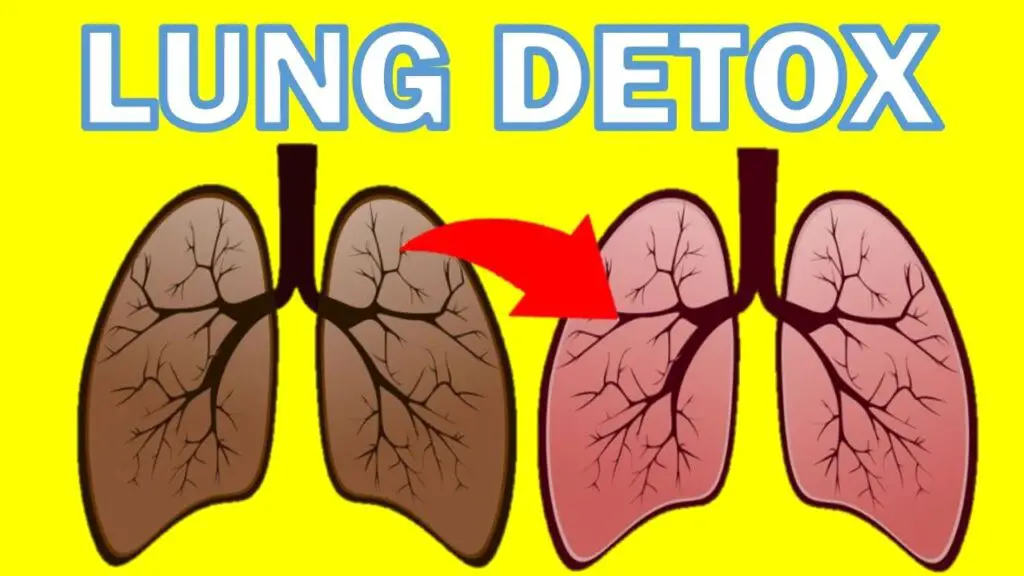It’s no secret that cigarettes are terrible for your lungs. Smoking is responsible for hundreds and thousands of deaths every year. Nicotine in itself isn’t bad for you; it’s the tar and chemicals that cigarettes also contain that do the damage. These chemicals can lead to lung diseases like COPD, and most cases of lung cancer.
Fortunately, it’s never too late to quit smoking, and doing so can reverse many of the damaging effects of cigarettes on your body. When you quit smoking, your cells can begin to repair and regenerate, helping you to live a healthier, longer life going forward. You don’t need to do anything to help them do this – but if you want to fully cleanse after quitting smoking, here are some of the best natural ways to remove nicotine and tar from your lungs:1. Practice steam therapy

Steam therapy is the practice of inhaling steam to open your airways and help your lungs to drain excess mucus containing all the bad stuff from cigarettes. Steam adds warmth and moisture to the air, which can improve your breathing and help loosen mucus inside your airways and lungs. Inhaling steam can offer immediate relief and help you to breathe more easily through the simplest lung cleansing method.
Steam therapy is good for short-term cleansing, but unless you’re planning to spend hours of your life with your face above a basin of hot water, it’s probably not a good standalone long-term solution for removing chemicals and nicotine from your lungs.
2. Exercise frequently

When you have better fitness levels, your lungs are more able to keep your heart and muscles supplied with the oxygen they need. Regular exercise is vital for cleansing your lungs and removing harmful cigarette chemicals once you quit smoking.
The hardest thing about exercising is getting started, but remember that even a minuscule effort is better than doing nothing at all. If exercise isn’t your thing, start small with walks in the park or gentle swimming exercises. These will help your lungs to build up strength and naturally cleanse themselves more efficiently.
3. Up your spinach intake
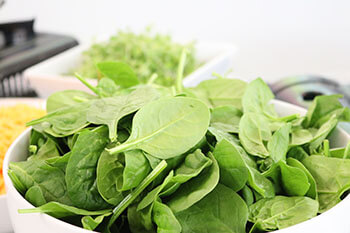
Spinach is packed full of beneficial nutrients like folic acid and an array of vitamins. It contains vitamin A and flavonoids, which experts say can help prevent the onset of lung cancer.
Spinach is also a good source of iron, which we all need to carry oxygen from our lungs to the rest of our bodies. Essentially, spinach can help the lungs to perform better while reducing the risk of disease caused by the contaminants found in cigarettes.
A recent study found that eating an amount of sodium nitrate equal to that found in 100 to 300 grams of spinach for just 2 days significantly improves lung function. So, what are you waiting for? Add spinach to your salads, stir into pasta, or sauté it with your favourite seasonings and serve it as a standalone side dish for a lung-healthy nutritional kick.
4. Hydrate with plenty of water

When you smoke, your body quite quickly becomes dehydrated. After you quit smoking, you’ll notice an improvement in your hydration levels even without increasing your water intake – but it’s worth doing so anyway for the best benefits to your lungs. You can quite literally hydrate your body back to normal, and flush out all the nicotine and tar by drinking plenty of water.
Just like every other part of your body, your lungs need to stay moisturized. When you drink enough water on a daily basis, you’ll help your lungs receive the right amount of moisture they need to function. Try to drink a minimum of two litres of water per day. If you forget to drink, purchase a 2-litre water bottle and fill it at the start of the day, then make sure it’s empty by bedtime.
5. Eat your oranges

Oranges are incredibly beneficial to the lungs, thanks to the whole host of nutritional compounds they contain. Oranges are a great source of an antioxidant carotenoid called cryptoxanthin, which helps prevent lung cancer. Oranges are also rich in vitamin C, which your lungs need to effectively transport oxygen throughout your body.
More specifically, orange peel has been found to provide support against respiratory distress. The peel has a lung cleansing effect that helps to break down and expel congestion, removing the harmful stuff from your body. Aim to drink a glass of freshly squeezed orange juice with your breakfast every morning. You could also add oranges to a healthy fruit salad for a light snack.
6. Add brazil nuts to your diet
Brazil nuts contain the highest source of a very powerful antioxidant called selenium. Selenium has been linked to the prevention of cancer, especially cancer in the lungs.
Studies have found that getting a good daily dose of selenium can reduce your cancer risk by 24%, especially in men. If you’re worried about the long-term effects of smoking, ensuring you’re getting a high selenium intake is the way forward.
You can add brazil nuts to your diet by eating them as a healthy snack, grinding them to make a tasty pesto, or lightly toasting them and toss them in your homemade stir-fries. If brazil nuts aren’t for you, other high sources of selenium include fish, pork, beef, turkey, and chicken.
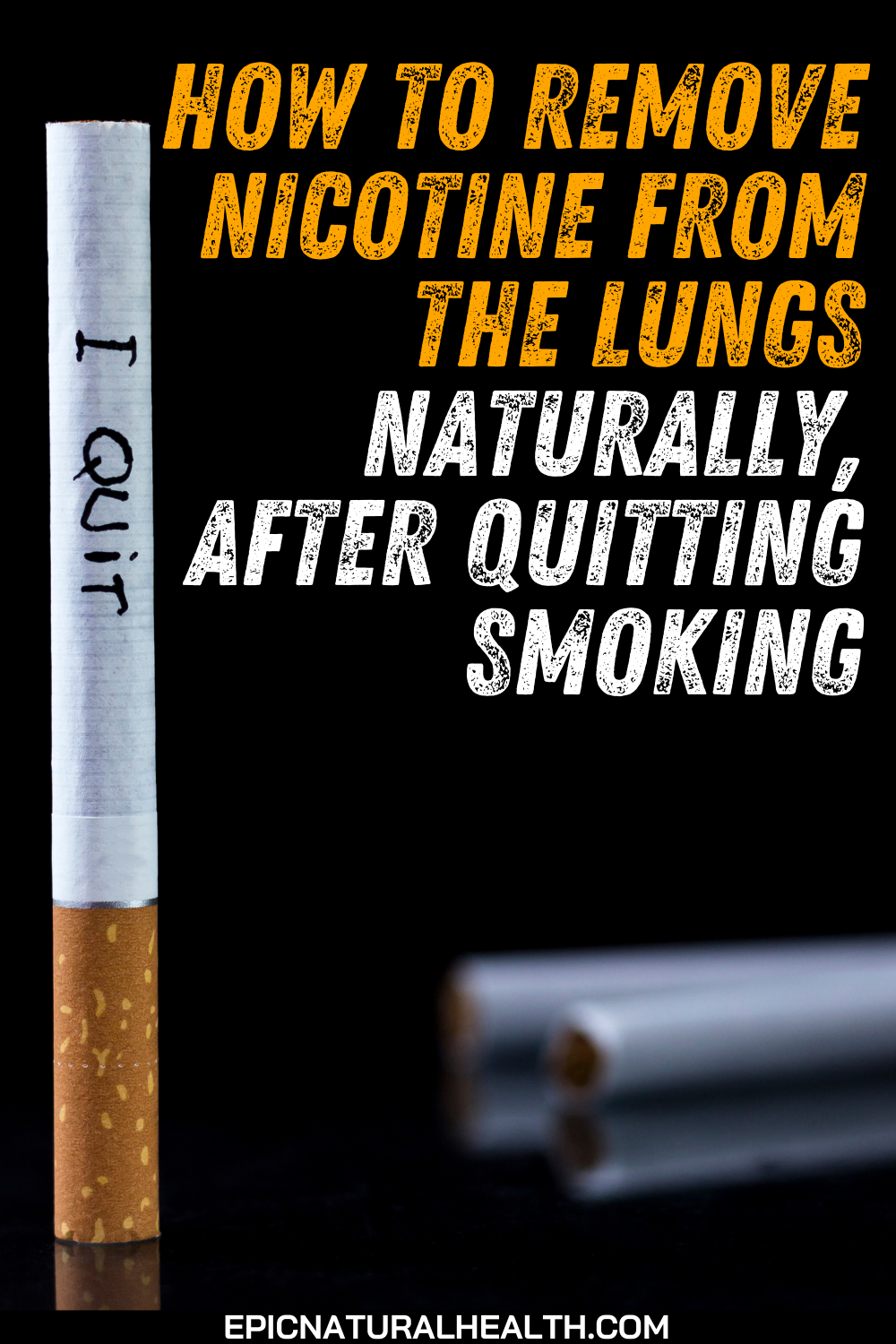
7. Controlled coughing
It might seem a little bizarre, but you can actually cough the nicotine out of your lungs when using a controlled method. You can do this by loosening the excess mucus lining your lungs and driving it up through your airways. It may not feel too pleasant, but coughing up mucus is an effective way of removing the bad stuff after you’ve quit smoking, helping your lungs to heal at a much faster rate.
To try controlled coughing for yourself, sit down on a chair with your back straight and your feet flat on the ground. Place your arms across your stomach and slowly breathe in through your nose. Then slowly exhale, leaning forward and pushing your hands against your stomach. Cough twice or three times with your mouth slightly open to dispel the mucus. Rest, then repeat as many times as you can without getting too intense.
- Extreme Detox: Omni Softgel has been designed to provide extreme detox. With its herbal detox properties, it helps the body to eliminate toxins effectively and efficiently.
- Detox Cleanse: Our product is the best detox for quick flush body cleansing. Effective to get rid of all toxins and harmful substances from your body.
- Flush Your System: Omni Softgel offers a quick flush system cleanser, for a fast and thorough cleanse. It's an ideal choice for those looking to detoxify and flush your system.
- System Cleanse: Our detox cleanser is developed to provide a complete system cleanse. It helps to detox from all toxins, including those from heavy use of harmful substances.
8. Drink green tea

One of the most effective herbal beverages of all time is green tea. Whether you personally enjoy its taste or not, there’s no denying the endless health benefits of the beverage.
For ex-smokers, green tea contains numerous antioxidants that are thought to help reduce inflammation in the lungs. These compounds can even protect lung tissue from the harmful effects of smoke inhalation. One recent study found that people who drank at least 2 cups of green tea per day had better lung function than those who drank none.
9. Stock up on anti-inflammatory foods
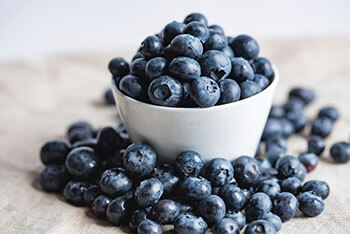
Inflammation is a common side-effect of long-term smoking, and it may take a while for your lungs to become less inflamed after you quit. Inflammation of the airways can make it more difficult to breathe, which may cause your chest to feel heavy and congested. Making sure you include enough anti-inflammatory foods in your diet can reduce inflammation and ultimately relieve these nasty symptoms.
There is a diverse range of anti-inflammatory foods for you to enjoy, so find your favourites and stock up on them today. Some of the best anti-inflammatory foods include blueberries, olives, walnuts, beans, lentils, and turmeric. It’s also worth cutting down on foods that worsen inflammation, like vegetable and seed oils, refined carbohydrates, excess alcohol, and some processed foods, especially meat.
10. Eat more ginger
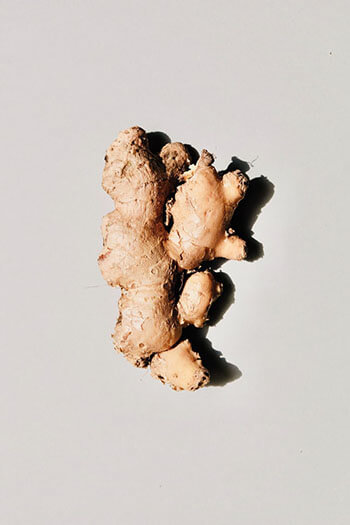
You might only ever eat it in biscuits, but ginger is actually an ancient herb that we’ve used as an herbal remedy for thousands of years. Notably, ginger improves breathing and is a powerful tool for removing cigarette toxins from your lungs.
Ginger also helps to expand your lungs, increasing lung capacity, and assisting in the breakdown and removal of mucus. This ultimately supports healthy circulation to your lungs, reducing the risk of a number of chronic lung diseases that smoking may present.
11. Improve your home’s air quality
It’ll take you a lot longer to cleanse your lungs after smoking if your own home’s air quality is poor. You want to ensure that while you’re in the process of dispelling the harmful nicotine and chemicals from your lungs, you’re breathing in the freshest, cleanest air in your home environment as possible.
Consider buying an air purifier to effectively trap contaminants, allergens, chemicals, and irritants from the air in a room to improve indoor air quality. If you live with a smoker, air purifiers can also remove second-hand smoke from your home. Remember to change the filters in your air purifier regularly and clean all vents to prevent a build-up of dust and other irritants.
Conclusion
Ultimately, having healthy lungs is vital for maintaining overall health. Lungs are self-cleaning, and they can partially cleanse themselves after they’re no longer exposed to harmful chemicals and carcinogens from cigarettes.
But part of this cleansing process leads to a build-up of mucus, which can make your lungs feel heavy and congested. That’s where these specific natural lung cleansing techniques will prove helpful.

Note that you’ll never be able to fully cleanse your lungs after you quit smoking, but you can at least eliminate the harmful chemicals and nicotine deposited by cigarettes in your lungs and airways. And you won’t just benefit your lungs from quitting smoking either – your whole body will reap the rewards, and you’ll also have a lot more cash to splash on long-term ventures.
Try to practice several of these methods on a daily basis. This will help your lungs to heal most quickly over a shorter period of time. Perseverance is key – don’t expect to see overnight results, but the longer you keep up the good habits, the faster and more effectively you’ll be able to remove nicotine from your lungs.

